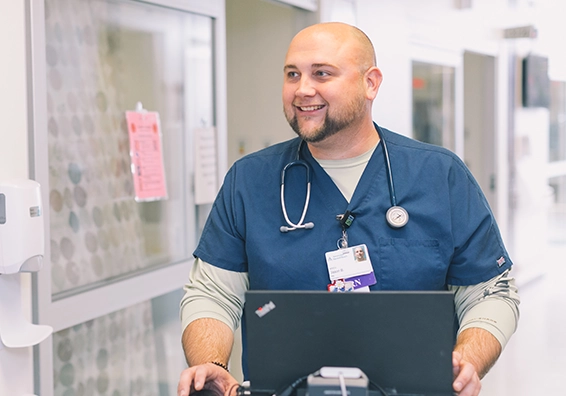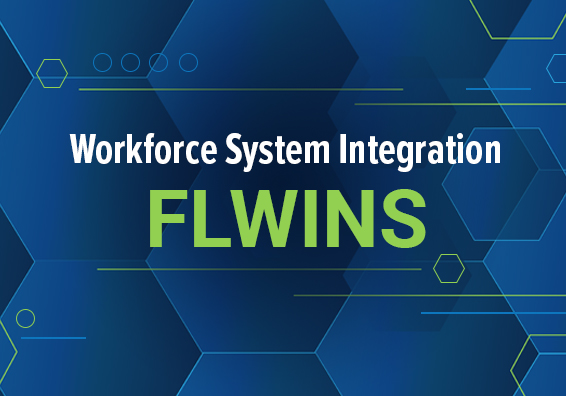The 2021 Reimagining Education and Career Help (REACH) Act and 2023’s Senate Bill 240 position Florida to help people with barriers to education and employment become self-sufficient through enhanced access to good jobs and career pathways that offer economic opportunity. CareerSource Florida and its partners in education and workforce development are implementing the REACH Act through a series of initiatives that improve alignment, consistency and outcomes.
REIMAGINING EDUCATION
AND CAREER HELP
Florida Workforce System Transformation Plan
Directed by the REACH Act, approved by the CareerSource Florida Board of Directors and affirmed by Governor Ron DeSantis, the three-pillar Florida Workforce System Transformation Plan advances alignment and consolidation of local workforce development boards; requires system-wide improvements for enhanced customer consistency and better leveraging of public funds; and guides regional planning to support workforce system alignment with education and economic development and optimize opportunities for regional economic growth.
Florida Workforce System Transformation Plan

Alignment and Consolidation
As Florida’s principal workforce policy organization, CareerSource Florida explored approaches to aligning Florida’s local workforce development boards, consistent with the charge for reducing the number of local boards under the REACH Act and in collaboration with the Governor’s REACH Office.
System-wide Improvements
CareerSource Florida’s Alignment Evaluation Initiative provided the opportunity to combine strategic local workforce development board alignment with statewide updates in policy and operations to improve consistency and coordination with local workforce development boards and state workforce system partners.
Focusing on system-wide consistency will streamline experiences for job seekers, workers and businesses, allowing a more agile workforce system to cultivate and strengthen partnerships that advance workforce development priorities and outcomes.


Regional Planning
The Workforce Innovation and Opportunity Act (WIOA) strongly encourages states to create planning regions that combine two or more local workforce development boards and areas to “align workforce development activities and resources with larger regional economic development areas and available resources to provide coordinated and efficient services to both job seekers and employers.” Updated planning regions among the newly structured 21 local workforce development boards also allows the CareerSource Florida network to continue seeking system-wide access, alignment and accountability improvements expected by the REACH Act.
Florida Credentials Review Committee
Empowered by Florida’s landmark REACH Act, the Florida Credentials Review Committee established a definition for credentials of value and adopted a Framework of Quality. The Framework of Quality is used to determine degree and non-degree credentials of value for inclusion on the state’s Master Credentials List, which identifies instructional programs that prepare Floridians for in-demand occupations. The members of the Credentials Review Committee include private and public sector leaders in business, workforce development, education, and government.


Letter Grades
The REACH Act seeks to improve accountability in the workforce system. The law calls for the REACH Office within the Executive Office of the Governor to develop criteria for assigning a letter grade to each local workforce development board and for CareerSource Florida to assign and make public the letter grades annually. The criteria is based on local board performance accountability measures and return on investment with the majority of the grade based on improvement by each local board in the long-term self-sufficiency of participants.
Workforce Technology System Integration
The REACH Act seeks to improve the strategic alignment and coordination of education and workforce initiatives through an online opportunity portal, allowing access to state, federal, and local services and tools. The new portal, developed by the state Department of Commerce, will provide Floridians broader access to education and training options, labor market information, career planning tools, workforce training, and education support.

Frequently Asked Questions
What is the Florida Workforce System Transformation Plan?
The Florida Workforce System Transformation Plan is a comprehensive plan to streamline and modernize the state workforce system, approved by the CareerSource Florida Board of Directors in February of 2023.
The plan aligns with the Reimagining Education and Career Help – or REACH – Act, which was unanimously passed by the legislature and signed into law by Governor Ron DeSantis in 2021. The REACH Act called for a reduction in the number of local workforce development boards.
The state board’s approval followed extensive research, listening, and recommendations in phases 1 and 2 of an Alignment Evaluation initiative that engaged more than 700 stakeholders. This work revealed an opportunity to enhance and strengthen the entire workforce system, state and local, as well as implement a plan for reducing the number of local workforce development boards. The research and engagement details are available here, and the recommendations to the state board are available here: CareerSource Florida Board of Directors.
The resulting Florida Workforce System Transformation Plan focuses on three pillars – Alignment and Consolidation, System-wide Improvements, and Regional Planning
What is the current status of the Florida Workforce System Transformation Plan?
The Florida Workforce System Transformation Plan is in Phase 3 – Implementation, which consolidates Florida’s 24 local workforce development boards into 21 to better serve Floridians needing employment services, job training, and increased skills. Implementation also will encompass overall statewide system improvements and enhanced regional planning.
The plan is being implemented by CareerSource Florida through contractor Ernst & Young LLP (EY). Implementation began in June 2023.
What areas are impacted?
All local workforce development boards in the state are impacted by the Florida Workforce System Transformation Plan.
There are 10 local workforce development areas impacted by the alignment and consolidation that will affect 27 counties:
- Realign Jefferson County with CareerSource Capital Region.
- Realign CareerSource North Florida as a five-county region serving Madison,
- Taylor, Lafayette, Hamilton and Suwannee counties.
- Consolidate CareerSource North Central Florida and CareerSource Florida Crown.
- Consolidate CareerSource Flagler Volusia and CareerSource Brevard.
- Consolidate CareerSource Tampa Bay and CareerSource Pinellas.
- Realign Monroe County with CareerSource Southwest Florida, which currently serves Charlotte, Collier, Glades, Hendry and Lee counties.
- Realign CareerSource South Florida as a single-county area serving Miami-Dade County.
These changes will benefit customers and stakeholders while maintaining a strong, localized approach to service delivery. The new alignment increases synergies between economic development and industries, leverages overall Florida growth across the realigned areas, addresses the need for services in smaller and rural counties, and joins highly interconnected counties to reduce administrative redundancies.
In addition, the plan includes enhanced regional planning affecting all local workforce development boards, CareerSource Florida and the Florida Department of Commerce (FloridaCommerce) and will address system-wide improvements to enhance customer service and better leverage public funds. Local elected officials will have a vital role in ensuring the implementation of the plan to address the needs of job seekers, workers, and businesses in their communities.
What is the process for implementing Pillar 1 of the Florida Workforce System Transformation Plan?
EY will execute Pillar 1, Alignment and Consolidation, in three stages: Design, Implement, and Sustain. During the Design stage, from June to September 2023, EY will use data collected in 2022 and engagement with key stakeholders to assess training needs, develop a stakeholder engagement plan and identify change impacts, working closely with impacted stakeholders, including areas where new or realigned boards will be formed.
The Implement stage, from October 2023 to January 2024, involves implementing the project plan. It includes stakeholder engagement to communicate new ways of working as well as changes in reporting requirements, and introduces operational tools, templates, training, and other resources to support adopting change.
From February to June 2024, the Sustain stage focuses on adopting changes with a strong focus on training delivery, technical guidance, and assistance to local workforce development areas to develop their proficiency with the new tools and processes.
What changes are recommended for Pillar 2, System-wide Improvements?
A strong message delivered by many of the 700 participants who provided feedback during phases 1 and 2 was the importance of system-wide improvements to help streamline the experience for both job seekers and businesses. Implementing system-wide improvements is also part of CareerSource Florida’s commitment to continuous improvement, with leaders at the state level playing a critical role in ensuring consistency of user experience and data collection.
Key areas for improved consistency include technology, administration, fiscal, procurement/contracts, and programmatic policies.
What changes are recommended for Pillar 3, Regional Planning?
Pillar 3 of the Florida Workforce System Transformation Plan calls for the state to develop Workforce Innovation and Opportunity Act (WIOA) Regional Planning Areas. Regional planning aims to develop, align and integrate strategies and resources to support regional economic growth. Additionally, legislation signed into law in 2023 requires administrative cost arrangements among planning regions.
Throughout the stakeholder input process, numerous examples surfaced of local workforce development boards collaborating with their neighboring boards to share resources, exchange ideas, and assist in times of need. In addition, stakeholders shared insights about peer groups of financial executives, IT professionals, communications personnel and others formed within the Florida Workforce Development Association. These examples and others indicate that a level of collaboration and regionalism is occurring organically.
By taking action to formally establish new regional planning areas of at least two, contiguous local workforce development boards, the workforce system will continue to build system capacity through regional service strategies, promote better alignment with economic development and education partners, improve workforce service quality and performance, including through coordinated and pooled funds for administrative costs, and drive greater regional coordination of supportive services for job seekers in need.
Alongside alignment and consolidation, and system-wide improvements, regional planning provides a comprehensive approach to:
- Enhance efficiencies;
- Ensure consistent customer experience;
- And enable resource sharing.
By June 30, 2024, at least two regional planning areas will be identified, structured, and compliant with regional planning requirements.
What work will occur in the summer and fall of 2023?
Work in July 2023 focused on governance in the areas impacted by alignment and consolidation to understand the needed changes. In August, extensive, one-on-one engagement is occurring with each local workforce development area affected to help assist in decision-making and planning to define the new structure that will be in place by June 2024. In September, work plans will be tailored to each local workforce development area impacted by alignment and consolidation. In October, timeframes will be set, and technical assistance will be provided to assist with implementation and initial work undertaken around regional planning.
Concurrently within each stage, EY will be assessing needs and developing recommendations to support implementation of system-wide improvements and regional planning as well as alignment and consolidation.
What role will county and elected leaders play in the process?
County leaders in the areas impacted by realignment and consolidation will lead the process of creating the new local workforce development boards, with support from EY, CareerSource Florida and FloridaCommerce. This includes all aspects of the new and consolidated local workforce boards, from the name to its structure and leadership.
Local leaders also will be instrumental in developing regional planning areas and working with local workforce development board leaders to ensure adherence to and support of systemwide improvements.
What will be different once the Florida Workforce System Transformation Plan is Implemented?
By June 30, 2024, the number of local workforce development boards will transition from 24 to 21 boards and at least two regional planning areas of at least two contiguous local workforce development boards will have been established. In addition, employers and job seekers will experience enhanced services focused on their needs. There will be consistent standards and approaches offered, providing greater flexibility in allocating resources.
Will the changes in Florida align with federal requirements?
Under the Workforce Innovation and Opportunity Act (WIOA), the Governor is responsible for designating local workforce development areas served by local workforce development boards. The implementation of the plan will align with all federal requirements.
Will this cause closure of any of Florida’s career centers for job seekers?
CareerSource Florida does not anticipate closing career centers. Decisions about the number of career centers in each local area will be made by the individual local workforce development boards.
Will realignment and consolidations negatively impact rural counties?
The plan’s recommendations are uniquely designed to address the needs for services in smaller and rural counties and to support workforce needs across the state.
Will the recommendations in the plan save money?
Federal funding allocations do not change because of realignment and consolidation. However, as boards take advantage of economies of scale, administrative efficiencies are anticipated over time. We expect these efficiencies to result in, among other things, better pricing and cost reductions across the network, leading to more resources for service delivery and improved outcomes for job seekers, workers and businesses.



